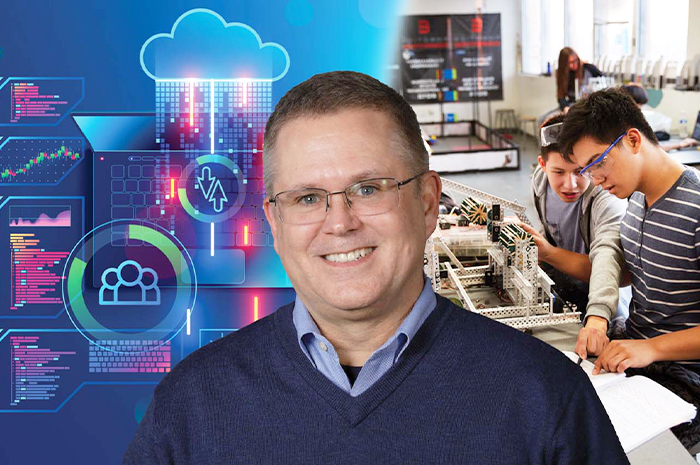
Second Wind
A former software engineer finds fulfillment helping high school students solve real-world problems.
By Rina Diane Caballar
Few people, when considering a second career, would choose to take on a horde of hormonal adolescents. Philip Arnold was no different. “There was nothing about stepping into a room full of teenagers that appealed to me,” he recalls.
But following his software engineering career, Arnold became an independent consultant, signing onto short-term contracts in IT support and systems administration. On the last day of his term at Frederick County, Maryland’s Career and Technology Center, the school secretary asked him to substitute teach an architecture and engineering class. Arnold refused at first. “I didn’t know what to do and where to begin,” he explains.
But after talking to the students about “what they were doing, the problems they were having, and how they were going about trying to work through those problems,” he “fell in love.”
Arnold says, “It was like stepping back into what I enjoyed most about high school and college: the learning process.” He asked to come back the next day and has stayed 10 years. Arnold’s work in the center, which offers workforce training to high school students, earned him the Washington Post’s 2021 Teacher of the Year award.
Arnold graduated from Virginia Tech in 1986 with a degree in agricultural engineering (now called biological systems engineering). “It was a perfect combination of the lifestyle I had growing up on a farm [in Frederick County] and my love of math and science,” he says. His career spanned sectors from water resources to mobile communications to internet data centers.
One of his most memorable projects involved helping Taipei, Taiwan’s capital city, mitigate risks from strong typhoons. Arnold was part of a team that installed remote field sensors around the city and developed a system to model rainfall movement based on their data. “I was doing engineering, but I was also having an impact,” he says. “It was meaningful and purposeful.”
Now as an engineering and architecture teacher for Frederick County Public Schools, Arnold helps his students develop their own potential to make a difference—whether with a “rocket stove” water treatment solution, a harness to help transport drinking water in Ethiopia, or a low-cost rotating chair lift that assists people with mobility issues to enter and exit a vehicle.
“I love that the work [students are] doing is helping prepare them for further education and careers in a field I enjoyed for 25 years,” Arnold says. Since he knows the expectations students will encounter in the workplace, he can help them gain the skills to create a “strong foundation for success.” It’s a type of fulfillment that “only came to me as a teacher, not as a contributor to a project,” he adds.
Arnold involves students in team projects, based on their interests, rather than individual assignments. “What they learn and experience and how they grow when they’re on a team is orders of magnitude better than when they work on their own,” he says. The former engineer wants to see more large-scale, hands-on, team-based projects in high school engineering education.
“I like the inclusion of invention education, where students have to come up with original work to solve a real-world problem,” he says. “You’re taking them beyond the curriculum, and the curriculum is necessary, but it should be a curriculum as applied to project work. If we can do that, then education becomes more individualized.”
Arnold wants to continue teaching for as long as he can, and he urges others to consider a similar path: “There may come a time in your career when you have an opportunity to do something new,” he suggests. “I would encourage you to offer yourself as a substitute teacher for your local school system and see if that experience touches you the way it did me … As I did, you might discover a second career.”
The biggest difference he’s made in his life has been with students, Arnold notes. “I am where I want to be. I am doing what I want to do. I have found my place.”
Rina Diane Caballar is a freelance writer covering technology and its intersections with science, society, and the environment.
© Frederick County Public Schools/Alexander Da Silva